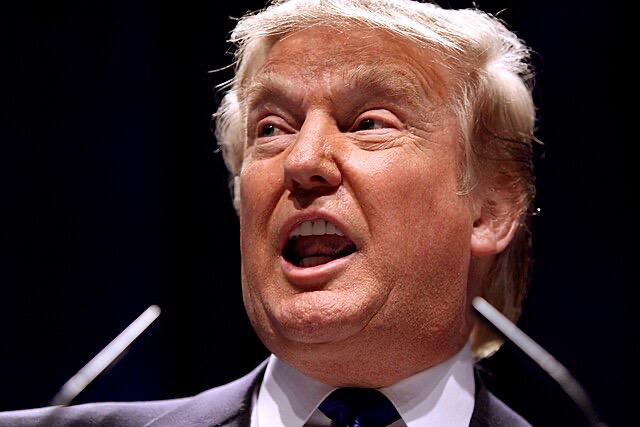Trump Considers Lifting All Restrictions on Ukraine’s Military Response, Calls Putin ‘Absolutely Crazy’
The geopolitical stage has been shaken once again as U.S. President Donald J. Trump, now serving his second nonconsecutive term, made headlines with his explosive remarks calling Russian President Vladimir Putin “absolutely CRAZY.” Following Russia’s massive drone and missile assaults on Ukraine, Trump signaled a potential policy pivot—seriously considering lifting all remaining U.S. restrictions on how Ukraine can engage militarily with Russia. This marks a profound shift in the U.S. approach to the war and could recalibrate the entire balance of international relations in Eastern Europe.
Trump’s words, echoing across newsrooms and capitals globally, aren’t just bravado—they may signal a hardening U.S. stance. The possibility of green-lighting Ukrainian strikes deeper into Russian territory with no limitations would have been unthinkable during Trump’s previous presidency. But the tide has turned. War fatigue, increasing aggression from the Kremlin, and a revived Trump administration with a different set of priorities all combine to make this a moment of historic weight.
Introduction
President Trump’s latest remarks on the Russia-Ukraine conflict have stirred fresh debates on Capitol Hill and among America’s international allies. His bold declaration about Putin’s sanity, paired with hints of lifting military restrictions on Ukraine, comes at a critical juncture in global politics. The ongoing war, now over three years long, continues to exact a heavy toll on human lives, regional stability, and the global economy.
The impact of these comments cannot be understated. When the sitting president of the United States publicly calls the leader of another nuclear power “crazy,” it doesn’t merely make headlines—it sets the tone for potential policy and military decisions that follow. Trump’s sentiment underscores growing frustration among Western leaders, who have watched the conflict stagnate despite billions in aid and military support to Kyiv.
Moreover, his willingness to consider removing all operational limitations for Ukraine’s military may redefine what support truly means. No longer constrained by range limits or target vetting, Ukrainian forces could, in theory, strike deep into Russian territory—including critical command centers and logistics hubs previously off-limits. The implications are massive, both for the battlefield and the diplomatic table.
Trump’s Statement: “Putin Is Absolutely Crazy”
Trump’s declaration about Putin being “absolutely CRAZY” came after one of the deadliest aerial bombardments by Russia, which included over 100 drones and cruise missiles striking multiple Ukrainian cities. It wasn’t just the intensity but the precision of these strikes targeting civilian areas that prompted global outrage—and Trump’s fiery response.
The president’s statement came during a nationally televised town hall where he was asked about America’s ongoing support for Ukraine. “Putin has lost it,” Trump said bluntly. “He’s absolutely crazy. You don’t bomb cities full of innocent people unless you’re completely detached from reality. And I’m seriously considering lifting every single restriction on how Ukraine defends itself.”
The reaction was immediate and polarized. Supporters praised Trump for his bluntness and decisiveness, while critics warned it could escalate the conflict into a wider war. Regardless, the statement reinforced Trump’s reputation for unpredictability—and his willingness to use strong language where other leaders tread cautiously.
The Russia-Ukraine Conflict: A Brief Recap
The Russia-Ukraine war began in earnest on February 24, 2022, when Russia launched a full-scale invasion of Ukraine, escalating years of simmering tension that began with Crimea’s annexation in 2014. The initial blitzkrieg was aimed at toppling the Ukrainian government quickly. However, the resilience of the Ukrainian military, massive Western support, and Russian miscalculations turned the conflict into a grinding war of attrition.
In the years that followed, Ukraine reclaimed significant portions of territory, while Russia doubled down on missile strikes, energy blackmail, and disinformation campaigns. The West, led by the U.S., poured in military aid, financial support, and humanitarian assistance. Despite the support, Ukraine has struggled with outdated equipment, troop fatigue, and restrictions on how supplied weapons can be used—particularly against targets on Russian soil.
The strategic stalemate has led to increasing pressure on Western leaders to do more. Many military analysts argue that restricting Ukraine’s ability to hit back across the border has created an imbalance—allowing Russia to attack from a safe distance. It’s in this context that Trump’s latest statement gains significance. Removing those shackles could turn the tide, but at what cost?
Trump’s Return to the Presidency
Trump’s comeback in the 2024 presidential election marked one of the most stunning political comebacks in modern American history. Defeating incumbent Joe Biden, Trump seized a second term by leveraging voter concerns about inflation, border security, and perceived foreign policy weakness. Among his first actions was a sharp reevaluation of American military engagements and alliances, including NATO’s role and funding mechanisms.
But unlike his first term, Trump’s current administration is facing a very different world—one that’s still reeling from a pandemic, grappling with climate crises, and deeply entrenched in one of the most significant armed conflicts on European soil since World War II. His approach this time has blended familiar rhetoric with sharper, more decisive posturing, especially toward adversaries like China, Iran, and notably, Russia.
On the Ukraine issue, Trump’s position has evolved. Initially critical of NATO and skeptical about prolonged foreign entanglements, he now appears more confrontational toward Putin—partly influenced by bipartisan pressure and global outrage over Russia’s indiscriminate attacks on civilian infrastructure. His latest moves indicate he’s ready to pivot from caution to confrontation.



